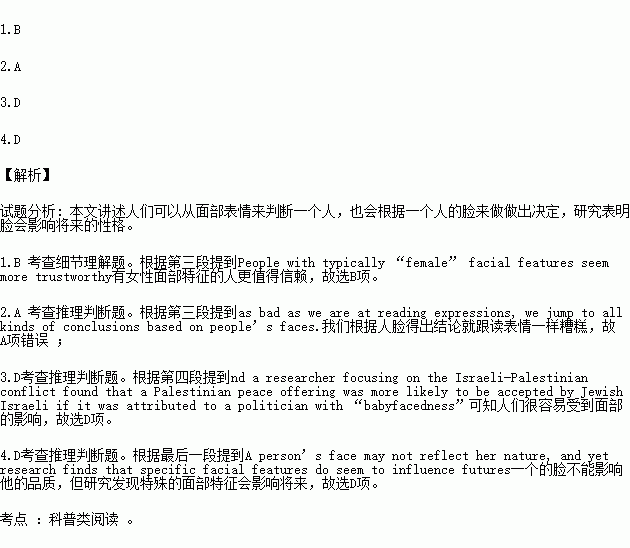题目内容
The truth was written all over her face. The eyes are the window to the soul. From those sayings, you would think that we could read faces. In fact, people tend to overestimate their ability to do it.
Most of us can’t distinguish between certain expressions without contextual clues. In one study, participants were unable to tell whether faces in photos were showing pain or pleasure about a quarter of the time. In another, when people watched silent videos of the same person experiencing pain and faking pain, they couldn’t tell which was which.
And yet, as bad as we are at reading expressions, we jump to all kinds of conclusions based on people’s faces. We might scoff at the ancient physiognomy—assessing character on the basis of facial feature—but we unknowingly practice it daily. Recent research shows that while there’s practically no evidence that faces reveal character, we nonetheless behave as if certain features signal certain traits. People with typically “female” facial features seem more trustworthy; those with lower eyebrows appear more controlling. In another study, people were ready to decide whether an unfamiliar face should be trusted after looking at it for just 200 milliseconds. Even when given a chance to look longer, they rarely changed their mind.
Such judgments can defy logic. Subjects playing a trust game invested more money with a player who had a trustworthy face than with one who didn’t—even when the two players had the same fame. Another study reported that judges needed less evidence to sentence a person with an untrustworthy face. And a researcher focusing on the Israeli-Palestinian conflict found that a Palestinian peace offering was more likely to be accepted by Jewish Israeli if it was attributed to a politician with “babyfacedness”.
Which brings us to a contradiction. A person’s face may not reflect her nature, and yet research finds that specific facial features do seem to influence futures. U.S. Army War College graduates with controlling-looking faces are more likely than their peers to become generals; people with obvious cheekbones, appearing strong and competent, are more likely to become CEOs of successful companies. This makes a certain sense. If everyone assumes strong-chinned Daniel is an ambitious person, he’s more likely to become one. Perhaps by treating others as though their face reveals their character, we motivate them to become the people we assume them to be.
1.Miss Green wants to find a pet shop for her dog while she is on holiday. She is most likely to choose the shop’s owner with ________.
A. a strong chin B. “female” facial features
C. low eyebrows D. obvious cheekbones
2.Which of the following is TRUE according to the author?
A. People rush to judgments based on facial features.
B. People are better at telling “pain” than “delight” from faces.
C. People consider it instructive to study the ancient physiognomy.
D. People would change their first impression if given more chances.
3.In Paragraph 4, the examples are used to show ________.
A. facial features reveal minds
B. trust is essential in big issues
C. baby faces are more trustworthy
D. decisions are easily influenced by faces
4.According to the last paragraph, the author believes ________.
A. facial features mirror character
B. people’s behavior is contradictory
C. people won’t be judged by appearance
D. facial features can influence eventual character

